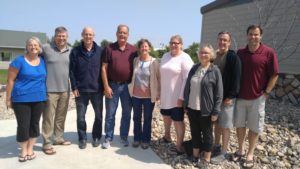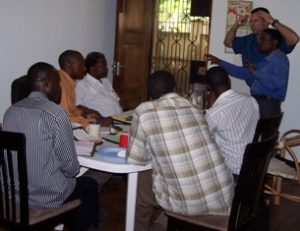
Last week I was in Iowa with my Pathways Bible Training leadership team. It was a wonderful and refreshing time where we renewed relationships, strategized how to be more effective in our work, and “spurred one another on toward love and good deeds.” I gave extensive reports focusing on the need to be culturally sensitive to those among whom we minister from very diverse cultures. As I prepared and then presented the talks on cultural value systems, learning styles and other issues, the Spirit was prompting me how much I have to grow in these areas.
We are all products to some degree of our upbringing and the culture in which we were raised. Most who read this blog share in common many elements of Western culture, such as individualism (vs. collectivism), low tolerance for ambiguity and low context (preferring direct communication), task-orientation (vs. relationally-oriented), narrative communication (vs. propositional truth statements) and several other areas. I have long recognized that I’m on one end of the spectrum when it comes to drivenness, intensity, and ambition. I’ve tried to channel this into healthy pursuits, which has helped me to accomplish quite a lot, a high value in the West.

However, in other cultures, such as in Africa working among my beloved pastors, it can cause problems. I have an agenda, and it is a good plan, to train pastors to study and teach the Bible well. But sometimes along the way I get so focused and intense on the task that I do not slow down to listen, reflect, and allow my African brothers (and others) to catch up. I’m charging on thinking everything is going great when others are being left in the wake.

The reality of this hit close to home as I pondered this past week that if some Africans feel this, my family must feel this much more. Although Africans and my family and colleagues know that I love them, and I have plenty of energy and enthusiasm to accomplish a lot, yet the fun of the relationship is lost in the midst of the drive. One of my favorite verses from years past has been Matt. 11:12, “And from the days of John the Baptist until now the kingdom of heaven suffers violence (or has been forcefully advancing), and the violent take it by force.” I heard in a sermon many years ago that we must be forceful and aggressive in advancing the Kingdom of God, and that image resonated with me. Yet I’m afraid that I’ve missed the mark, for this is neither what the verse means nor the example our Lord set for us in how the kingdom grows.

Rather than working against my natural disposition, trying to slow down or be less energetic, which is part of how God has wired me, I need to channel these vigorous blessings into healthy expressions. Instead of charging ahead of people, giving answers and solutions, I must focus my energy on listening to the questions, on gently encouraging the struggling, on being aware of how I’m perceived instead of succeeding in the task. A quick perspective check reminds me that I’m such a very small part of God’s great plan, and he certainly doesn’t need me, and his success in Africa is not up to me. The destructive self-talk, “Eric, you need to do more, you need to go further, push it, you’re not measuring up…” is all lies from the pit of hell. Rather than pushing, forcing, driving, I might actually be much more effective if I would “cease striving and know that I am God. I will be exalted among the nations, I will be exalted in the earth.” (Psalm 46:10) There is much joy and freedom in these realities, and I’m excited for the ways God may work in me and through me as he helps me overcome myself and be more conformed into His image.
Pressing on (gently) by God’s grace, Eric
